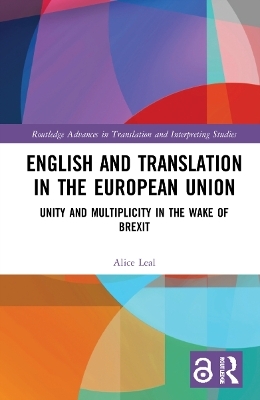
English and Translation in the European Union
Routledge (Verlag)
978-0-367-24491-0 (ISBN)
This book explores the growing tension between multilingualism and monolingualism in the European Union in the wake of Brexit, underpinned by the interplay between the rise of English as a lingua franca and the effacement of translations in EU institutions, bodies and agencies.
English and Translation in the European Union draws on an interdisciplinary approach, highlighting insights from applied linguistics and sociolinguistics, translation studies, philosophy of language and political theory, while also looking at official documents and online resources, most of which are increasingly produced in English and not translated at all – and the ones which are translated into other languages are not labelled as translations. In analysing this data, Alice Leal explores issues around language hierarchy and the growing difficulty in reconciling the EU’s approach to promoting multilingualism while fostering monolingualism in practice through the diffusion of English as a lingua franca, as well as questions around authenticity in the translation process and the boundaries between source and target texts. The volume also looks ahead to the implications of Brexit for this tension, while proposing potential ways forward, encapsulated in the language turn, the translation turn and the transcultural turn for the EU.
Offering unique insights into contemporary debates in the humanities, this book will be of interest to scholars in translation studies, applied linguistics and sociolinguistics, philosophy and political theory.
Alice Leal is Senior Lecturer at the University of Vienna, Austria.
Table of contents
Preface
Introduction
1. Language, meaning and identity: From mother tongue to lingua franca
1.1 Introduction
1.2 The classical paradigm and its legacy: Logos and affections of the soul
1.3 A historical note on the rise of vernaculars: Cuius regio, eius lingua
1.4 The Enlightenment and its legacy: Language as an instrument for communication, as divine logos and as a nation’s genius
1.5 Linguistic turn and pragmatic turn: The enduring appeal of universalism
1.6 Postmodernism, poststructuralism, deconstruction: Beyond the dichotomy universalism versus relativism
1.7 Introducing a lingua franca
1.8 Multiples Englishes: Competing paradigms in liberation linguistics
1.9 English as lingua franca: A neutral instrument for communication?
1.10 Final remarks
Further reading
References
2. The EU and English as a "lingua franca": De jure multilingualism versus de facto monolingualism
2.1 Introduction
2.2 De jure multilingualism: Herder would be proud
2.3 The pecking order of EU languages: English, the other 23, European languages with no EU status, non-territorial and migrant languages
2.4 De facto monolingualism: Lockean instrumentality and the EU’s "lingua franca"
2.5 One language for communication, many for identification: Pernicious paradox or harmonic reality?
2.6 Language policy: What, why, how?
2.7 Education language policies: Foreign language teaching in the EU
2.8 Final remarks
Further reading
References
3. Translation and the EU: The tension between unity versus multiplicity
3.1 Introduction
3.2 EU language services: Setup, numbers and language regimes
3.3 Translations that are originals that are translations
3.4 Translations and originals: From belabouring the (seemingly) obvious to breaking free from the dichotomy
3.5 Intraduisible, intradução, untranslatable: Back with a bang
3.6 Unity versus multiplicity and the EU’s double responsibility: A necessary aporia
3.7 "Invent gestures, discourses, politico-institutional practices": A language turn and a translation turn for a more multilingual EU
3.8 Final remarks
Further reading
References
4. The EU as a community in formation in the wake of Brexit: For a new linguistic regime
4.1 Introduction
4.2 "Together in disunity": The EU as a common market and a community of shared fate in formation
4.3 EU democracy, public sphere(s), nationalism and transnationalism: Juxtaposing and mixing identities
4.4 Language contact and language dynamic: Ligatures without options
4.5 Linguistic justice: English as friend and foe
4.6 The future of English in the world: ELF, EFL, ELT
4.7 The future of English in the EU in the wake of Brexit
4.8 Intercomprehension and transcultural skills: When others remain others
4.9 Final remarks
Further reading
References
5. The future of language and translation in the EU: A language turn, a translation turn and a transcultural turn
5.1 Introduction
5.2 Language turn
5.3 Translation turn
5.4 Transcultural turn
5.5 Urgent research needed
5.6 Final remarks
Further reading
References
Final Remarks
Annex: Interview with DG Translation
| Erscheinungsdatum | 22.06.2021 |
|---|---|
| Reihe/Serie | Routledge Advances in Translation and Interpreting Studies |
| Zusatzinfo | 1 Line drawings, black and white; 1 Illustrations, black and white |
| Verlagsort | London |
| Sprache | englisch |
| Maße | 152 x 229 mm |
| Gewicht | 426 g |
| Themenwelt | Geisteswissenschaften ► Sprach- / Literaturwissenschaft ► Sprachwissenschaft |
| Sozialwissenschaften ► Politik / Verwaltung | |
| ISBN-10 | 0-367-24491-8 / 0367244918 |
| ISBN-13 | 978-0-367-24491-0 / 9780367244910 |
| Zustand | Neuware |
| Haben Sie eine Frage zum Produkt? |
aus dem Bereich


